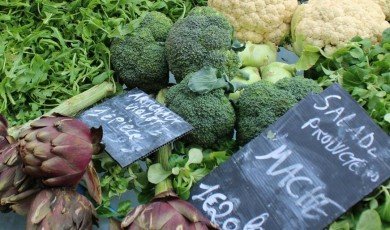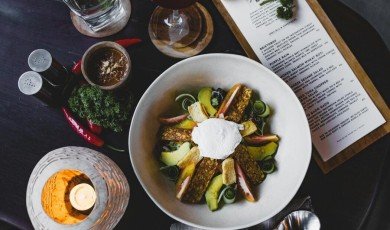Farm to Fork: Sustainability Practices in Dutch Restaurants
Discover how restaurants in the Netherlands are leading the way in sustainable dining, connecting local farms to your fork while prioritizing eco-conscious practices.
Introduction: A Taste of Sustainability in the Netherlands
The Netherlands, famous for its picturesque fields of tulips and innovative agricultural practices, is quickly becoming a hub for sustainable dining. Dutch restaurants are embracing the farm-to-fork philosophy, a movement that emphasizes the use of locally sourced, seasonal ingredients and environmentally friendly operations. This approach not only results in fresher, more flavorful dishes but also supports regional farmers, minimizes food miles, and reduces the environmental footprint of the foodservice industry.
In this blog post, we will explore how the farm-to-fork movement is shaping sustainability practices in Dutch restaurants. We’ll delve into the concrete steps these eateries are taking, highlight some standout establishments, and examine the positive impact on the local communities, environment, and food culture of the Netherlands.
From Local Farms to Fine Dining: The Dutch Farm-to-Fork Movement
What Does Farm-to-Fork Mean?
Farm-to-fork, also known as farm-to-table, is a commitment to sourcing ingredients directly from local farms, ensuring transparency, freshness, and traceability in the food served. In the Netherlands, this approach often involves close collaboration between chefs and farmers, with menus that shift regularly based on seasonal harvests. This philosophy champions not only taste and quality but also environmental care and community well-being.
Key Sustainability Practices in Dutch Restaurants
- Locally Sourced Ingredients: Dutch restaurants increasingly purchase produce, dairy, meat, and even beverages from nearby farms. By reducing the distance food travels, known as "food miles," they lower their carbon footprint and support local economies. In Amsterdam, for example, you’ll find many eateries boasting partnerships with urban farms and rural suppliers within Dutch borders.
- Seasonal Menus: Seasonal cooking is at the heart of farm-to-fork practices. Chefs in the Netherlands design menus based on what is fresh and abundant, leading to dishes energized by the best each season offers. This not only enhances taste but also reduces the need for energy-intensive cold storage and transportation.
- Minimizing Food Waste: Dutch restaurants are innovating to cut back on food waste. Some use whole-animal butchery, nose-to-tail and root-to-leaf cooking, and creative ways to repurpose “ugly” or surplus produce. Composting programs and food donations are also common, ensuring that less food ends up in landfills.
- Eco-friendly Operations: From energy-efficient kitchen equipment to biodegradable packaging and sustainable building materials, many Dutch restaurants are considering the entire lifecycle of their operations. Water-saving devices, solar panels, and green roofs are becoming features of forward-looking establishments.
- Organic and Biodynamic Choices: Organic farming is thriving in the Netherlands. Restaurants often certify their ingredients as organic or biodynamic, ensuring fewer chemicals and pesticides are used in production. This also promotes healthier soil and biodiversity.
Leading the Way: Dutch Restaurants Championing Sustainability
Across the Netherlands, many restaurants are setting the standard for sustainable farm-to-fork dining. Here are some notable examples:
- De Kas (Amsterdam): Housed in a converted greenhouse, De Kas grows much of its own produce onsite in gardens and greenhouses. The daily-changing menu celebrates hyperlocal vegetables and herbs, harvested fresh each morning.
- Lokaal (Doetinchem): This restaurant collaborates closely with local farmers and producers, serving dishes made exclusively with ingredients from within the region. Lokaal is celebrated for its transparent sourcing and minimal waste kitchen.
- Instock (Amsterdam, Utrecht & The Hague): Instock is dedicated to fighting food waste, turning "imperfect" or surplus ingredients from supermarkets and producers into creative, gourmet meals.
- Rotterdam’s Urban Agriculture Scene: Several restaurants in Rotterdam source from urban rooftop and community gardens, such as Uit Je Eigen Stad, which integrates food growing, harvesting, and cooking in one place.
Benefits of Dutch Farm-to-Fork Practices
The positive impacts of farm-to-fork dining extend far beyond flavorful dishes. Here’s how Dutch restaurants' sustainability practices make a meaningful difference:
- Reduces Carbon Emissions: By sourcing food locally, restaurants cut down on transport emissions. Shorter supply chains mean less pollution and fresher food.
- Strengthens Local Communities: Supporting local farmers and producers helps sustain rural economies, fosters community connections, and can create new green jobs.
- Enhances Biodiversity and Soil Health: Choosing organic and seasonal ingredients encourages varied, eco-friendly agriculture and reduces dependency on monocultures.
- Enriches Culinary Creativity: Seasonal limitations push chefs to be inventive, resulting in unique menus that change regularly and celebrate regional diversity.
- Boosts Consumer Awareness: Dutch diners are becoming more conscious of the stories behind their food, prompting them to make informed, responsible choices.
Challenges and Looking Ahead
Despite the clear benefits, farm-to-fork dining in the Netherlands faces hurdles. Availability of certain crops in winter months, higher costs for small-scale production, and the need for reliable supply chains can present challenges. However, ongoing innovation, government incentives, and growing consumer demand are driving positive change. The Dutch hospitality industry is renowned for its adaptability and collaborative spirit, which bodes well for the continued growth of sustainable dining.
How Diners Can Support Sustainable Restaurants
If you’re passionate about sustainability, there are simple ways to support farm-to-fork efforts next time you dine out in the Netherlands:
- Choose restaurants that highlight local, organic, or seasonal ingredients on their menus.
- Ask staff about sourcing and sustainability policies.
- Avoid food waste by ordering mindfully and taking leftovers home.
- Share your experiences and encourage others to try sustainable Dutch restaurants.
Conclusion: A Sustainable Future for Dutch Dining
The Netherlands is at the forefront of sustainable hospitality, with its restaurants actively embracing farm-to-fork principles. By connecting local farms to your fork, Dutch chefs and restaurateurs are not only creating delicious meals but also nourishing the environment, their communities, and future generations.
As the farm-to-fork movement gains momentum, dining out in the Netherlands becomes an act of conscious deliciousness. The next time you visit a Dutch restaurant, relish the flavors, and know that you’re part of a greater shift towards sustainability, one bite at a time.
Curious to explore sustainable Dutch dining? Check out our curated list of farm-to-fork restaurants in the Netherlands and start your eco-friendly culinary journey today!








